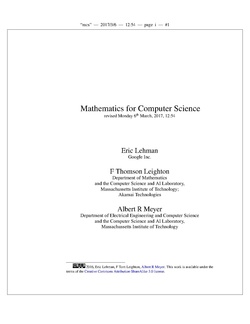Biography:Albert R. Meyer
Albert Ronald da Silva Meyer | |
|---|---|
| Born | November 5, 1941 |
| Alma mater | Harvard University |
| Spouse(s) | Irene Greif |
| Awards | ACM Fellow (2000) |
| Scientific career | |
| Fields | Computer science |
| Institutions | MIT |
| Doctoral advisor | Patrick C. Fischer |
| Doctoral students | Nancy Lynch, Leonid Levin, Jeanne Ferrante, Charles Rackoff, Larry Stockmeyer, David Harel, Joseph Halpern, John C. Mitchell, Edward McCreight |
| Website | people |
Albert Ronald da Silva Meyer (born 1941) is Hitachi America Professor emeritus of computer science at Massachusetts Institute of Technology (MIT).
Biography
Meyer received his PhD from Harvard University in 1972 in applied mathematics, under the supervision of Patrick C. Fischer.[1] He joined the Department of Electrical Engineering and Computer Science (EECS) faculty at MIT in 1969. Meyer became the Hitachi America Professor of Computer Science and Engineering in 1991. He retired from MIT in 2016.[2]
Academic life
Meyer's seminal works include (Meyer Stockmeyer), which introduced the polynomial hierarchy. He has supervised numerous PhD students who are now famous computer scientists; these include Nancy Lynch, Leonid Levin, Jeanne Ferrante, Charles Rackoff, Larry Stockmeyer, David Harel, Joseph Halpern, and John C. Mitchell. He was the editor-in-chief of the international computer science journal Information and Computation from 1981 until 2020.[3]
Awards
He has been a Fellow of the American Academy of Arts and Sciences (AAAS) since 1987,[4] and he was inducted as a Fellow of the Association for Computing Machinery (ACM) in 2000.[5]
Personal life
He is married to the computer scientist Irene Greif.[6]
Publications
- 1991. Research Directions in Computer Science: An MIT Perspective. (Ed. with John Guttag, Ronald Rivest, and Peter Szolovits) MIT Press.
- Meyer, Albert R. (1972). "The equivalence problem for regular expressions with squaring requires exponential space". Proc. 13th Annual Symposium on Switching and Automata Theory. pp. 125–129. doi:10.1109/SWAT.1972.29..
References
- ↑ Albert Ronald da Silva Meyer at the Mathematics Genealogy Project.
- ↑ "Collection: Albert Meyer papers | MIT ArchivesSpace". https://archivesspace.mit.edu/repositories/2/resources/872.
- ↑ Information and Computation
- ↑ "M". Members of the American Academy of Arts & Sciences: 1780–2005. http://www.amacad.org/publications/BookofMembers/ChapterM.pdf.
- ↑ "ACM Fellows". http://fellows.acm.org/homepage.cfm?alpha=M&srt=alpha. "ACM: Fellows Award / Albert R Meyer". http://fellows.acm.org/fellow_citation.cfm?id=1215300&srt=all. "For fundamental advances in complexity theory and semantics of programming, and for outstanding service and education of graduate students."
- ↑ McCluskey, Eileen (20 October 2008). "Irene Greif '69, SM '72, PhD '75 Knitting together computers and people". MIT Technology Review. http://www.technologyreview.com/article/410994/irene-greif-69-sm-72-phd-75/.
External links
- Meyer, Albert R. at MathSciNet
- {{DBLP}} template missing ID and not present in Wikidata.
- Albert Meyer papers, MC-0377. Massachusetts Institute of Technology, Department of Distinctive Collections, Cambridge, Massachusetts.
 |


